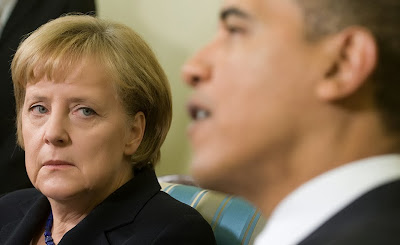Revelations this week that
the US may have monitored the phone calls of up to 35 world leaders have been
making significant diplomatic waves in American relations with several powerful
countries, and prove that the Edward Snowden saga is far from over. This week
the German newspaper Der Spiegel published a damning article outlining the
evidence for, extent of, and political effects of the NSA’s alleged
surveillance program run out of the US embassy in Berlin, with targets including
the cell phone of Chancellor Angela Merkel herself since 2002. Outrage is
mounting in allies as far afield as Mexico, France, and Germany as citizens
question an already unpopular superpower’s intentions.
While surveillance centers
operating from within embassies technically enjoy diplomatic immunity for their
actions, when they get caught as they have now the backlash is swift and harsh.
The United States is already viewed throughout the world as a self-centered
bully, willing to push its policies on supposed friends and pressure countries
into taking actions they would not normally. The current scandal only serves to
augment the image of the US as an irresponsible, overbearing hegemon. That an
intelligence agency would secretly listen in on the phone calls of not only the
citizens of our allies but their leaders themselves is politically unethical
and extremely damaging. Today reports are surfacing that President Obama himself was told of the surveillance of Chancellor Merkel in 2010 and has repeatedly re-approved the program, further damaging US-German relations although he denies the allegations.
The files used by Der
Spiegel and other news sources to ascertain the extent and targets of the NSA’s
surveillance program were obtained from the files released by Edward Snowden
earlier this year. The ongoing political headache of the Snowden chapter was
thought to be over after the initial reports of the NSA spying on US citizens
blew over. He would remain a thorn in US-Russian relations for the moment, but
the primary damage was believed to be done. Merkel’s own chief of staff Ronald
Pofalla went so far as to say that the NSA scandal was over in August. Yet
as more and more details surface of extensive US surveillance of our allies’
governments, the diplomatic ramifications of the Agency’s actions are only
starting to manifest.
In Germany, public opinion
is at a boiling point over the scandal, with 58% of Germans saying that the
current Trans-Atlantic Free Trade Agreement talks should be put on hold until
the issue is resolved. The EU’s session in Brussels this week became largely
devoted to tackling other possible ongoing surveillance programs. Twenty-one
countries have decided to draft a General
Resolution promoting the right of privacy on the Internet and put it before
the UN to avoid such situations in the future. US efforts to increase
cooperation with Mexico on the drug war are also now in jeopardy as it was
revealed that President Enrique Pinedo Nieta’s emails also may have been
monitored. The statements of officials echo the same theme over and over: we
expected this of states like Russia and China, but not of our friend America. For their part, the Russians could not be happier that their biggest competitor seems to be blundering its way to its own demise.
In the decade since the
ill-fated invasion and occupation of Iraq, global opinions about the United
States have shown widespread discontentment with the way the world’s only
superpower handles its foreign relations. Viewed as alternately brutal,
reckless, and irresponsible, the image of the United States has suffered
repeated bruising lately on the tails of the government shutdown. The NSA
findings only serve to increase the perception of America as an inept and
untrustworthy ally. The less stock our longtime partners put in our friendship,
the less likely they will be to accede to even mutually beneficial measures
such as the Trans-Atlantic Free Trade Agreement. Yet if history serves as any
guide, the United States does not have great prospects for curtailing its
offensive behavior simply because our allies mislike it. If the country does
not seriously reassess its intelligence collection and surveillance policies,
we may one day find ourselves backed into a corner by a rising power such as
China with no more friends to bail us out.

No comments:
Post a Comment